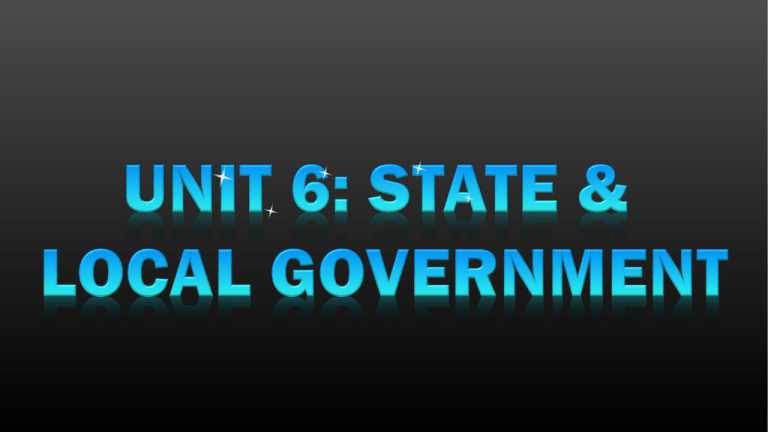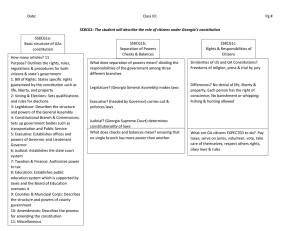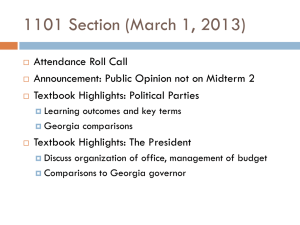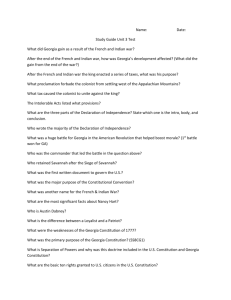State & Local Government PowerPoint
advertisement

SS8CG1 TSW describe the role of citizens under GAs constitution SSCG81a: Explain the basic structure of the GA state constitution • Written in 1977, approved by state’s citizens in 1983 • Broken up into 11 articles & is 89 pages long • Outlines the rights, rules, regulations & procedures for both citizens & state’s government • • • • • • • • • • • Article I: Bill of Rights Article II: Voting & Elections Article III: Legislative Branch Article IV: Constitutional Branch & Commissions Article V: Executive Branch Article VI: Judicial Branch Article VII: Taxation & Finance Article VIII: Education Article IX: Counties & Municipal Corporations Article X: Amendments to the Constitution Article XI: Miscellaneous Provisions GAs Constitution • Article I: States specific rights guaranteed by the constitution such as life, liberty, and property • Article II: Sets qualifications and rules for elections • Article III: Describes the structure and powers of the General Assembly • Article IV: Sets up government bodies such as transportation and Public Service • Article V: Establishes offices and powers of Governor and Lieutenant Governor • Article VI: Establishes the state court system • Article VII: Authorizes power to tax • Article VIII: - Establishes public education system which is supported by taxes and the Board of Education oversees it • Article IX: Describes the structure and powers of county government • Article X: Describes the process for amending the constitution SS8CG1b: Explain the concepts of separation of powers & checks and balances • Just like the United States constitution, the Georgia constitution divides the responsibilities of the government among three different branches and is known as separation of powers. This process of separating powers creates a “limited government”. • GAs legislature (Georgia General Assembly) makes laws • GAs executive branch (headed by Governor) carries out & enforces laws • GAs judicial branch (Georgia Supreme Court) determines constitutionality of laws • Most officials in each of the three branches are directly elected by the voters which requires them to be responsive to the citizens of Georgia. • Dividing the basic functions of government into three branches ensures that no single branch has more power than the other. Each branch can check the power of the others, ensuring that no branch becomes too powerful. This system is called checks and balances. • Ex: If the GA General Assembly (legislature) passes a law that the governor (executive) disagrees with, he/she can veto it. The Supreme Court can determine if the law is constitutional or not. If the law is found unconstitutional, then it becomes null and void. No one branch has ultimate power over the state government. Each works together to keep the others in line. SS8CG1c: Describe the rights & responsibilities of citizens • Bill of Rights in both GA and US Constitutions include an article outlining the rights and responsibilities of citizens. • Both have similar rights and freedoms (religion, speech & press, trial by jury) • Differences? • • • • Paragraph I: Life, liberty & property Paragraph III: Right to a person’s own conscience Paragraph XXI: No banishment or whipping for crime committed Paragraph XXVIII: Fishing & hunting allowed • All citizens have civic responsibilities: • Paying taxes • Take care of ourselves • Respect the rights of • Serving on juries others • Volunteering • Obey rules and laws • Voting SS8CG1d: Explain voting qualifications and elections in GA • 3 voting qualifications in Georgia • US citizen • 18 years old by election day • Legal resident of GA & the county where person wants to vote in • Voter cannot currently be serving jail time for a felony offense or ruled mentally incompetent • How to register: 1) download voting registration form online 2) mail to GA secretary of states office • Voting is only allowed at a polling place in their district (precinct) • Georgians usually vote in 3 types of elections: • Primary: members of Republican & Democratic parties run for offices of governor, lieutenant governor & secretary of state (held in July or August during even numbered years) • General: winners from primaries, along with third parties and independents compete for political office (held in even numbered years on 2nd Tuesday of November) • Special: an election used to present a special issue to voters or to fill a vacancy • If a candidate does not receive more that 50% of the vote, then a run-off is held, can take place in a primary or general election, voters sometimes can vote on a law (referendum) SS8CG1e: Explain the role of political parties in government • Two party system has been the norm since the 1860s • Republican & Democratic • Georgia has primarily been a republican state since the late 20th century • The role of political parties in both Georgia & the US is for groups of like-minded people who share common beliefs & ideas work together in hopes of electing their members to political offices. • GA Democrats and Republicans both hold political offices today. • Parties give voters a choice in deciding which elected official best represents their interests. SS8CG1f: Identify wisdom, justice & moderation as the three principles of the Pledge of Allegiance to the GA flag • Adopted on March 28, 1935 by Governor Eugene Talmadge • “I pledge allegiance to the Georgia flag and to the principles for which it stands – wisdom, justice & moderation • Georgia’s current flag was adopted in 2008; Consisting of 3 stripes of red, white, red, a blue canton containing a ring of 13 stars encompassing the state's coat of arms in gold. The coat of arms consists of an arch that symbolizes the state constitution & three pillars representing the legislative, judicial & executive branches. The words “wisdom,” “justice,” & “moderation” are wrapped around the pillars. • Why these 3 words? • Wisdom: reminds the legislature to be wise in creating laws • Justice: appeals to the judicial branch for fair and just decisions • Moderation: urges the executive branch to carry out laws calmly within the boundaries of the law






